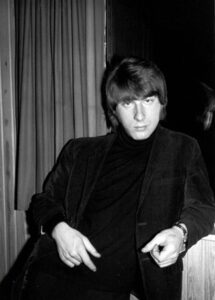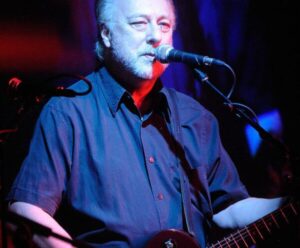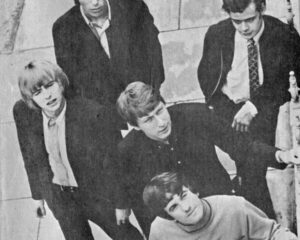Legendary Yardbirds Guitarist Chris Dreja Dies at 79: A Tribute to the Unsung Architect of British Rock

For many music lovers, the names that shaped rock’s golden age are etched in memory like verses from a favorite song. They were the dreamers who began in small-town garages, neighborhood pubs, and cramped basements, driven by passion rather than fame. These were the men and women who would ultimately change the sound of modern music — transforming the raw energy of youth into timeless art. Among these pioneers was Chris Dreja, a man whose quiet brilliance and steady artistry helped build one of rock’s most influential bands: The Yardbirds.
Today, the world mourns his passing. Dreja, who died at the age of 79, was one of the last surviving members of The Yardbirds’ original lineup — and the only one to appear on every record the band ever released. His sister-in-law, Muriel Levy, confirmed his death, and tributes quickly poured in from across the globe. Former bandmate Jimmy Page, now a rock legend in his own right, honored Dreja as a “true artist” whose subtle but powerful musicianship helped lay the foundation for generations of guitarists to come.
The Heart of the British Rock Revolution
To understand Chris Dreja’s legacy, one must look back to early 1960s London — a city alive with the sounds of change. Rock ’n’ roll had crossed the Atlantic, and a new wave of British musicians was reinterpreting it through the lens of blues, rhythm, and rebellion. In 1963, a group of young friends came together to form a band that would soon challenge every expectation of what rock music could be. That band was The Yardbirds.
Dreja, born Christopher Walenty Dreja in Surbiton, England, in 1945, joined the group as a rhythm guitarist. At first, they were a straightforward blues outfit, heavily influenced by American legends like Muddy Waters and Howlin’ Wolf. But as the years progressed, The Yardbirds began to push boundaries. Their live performances became famous for their chaotic energy and extended “rave-up” sessions — long, improvised instrumental jams that sent audiences into a frenzy.
Dreja’s role within the group was often understated, yet essential. While frontmen and lead guitarists drew the spotlight, Dreja’s playing anchored the music — his rhythm work providing the heartbeat beneath the fire and fury. His understanding of structure and tone allowed The Yardbirds’ experimental edge to flourish without collapsing into chaos.

A Band That Changed Everything
The Yardbirds would go on to become one of the most important incubators of talent in rock history. In their short but extraordinary career, they launched the trajectories of Eric Clapton, Jeff Beck, and Jimmy Page — three guitarists who would each, in their own way, redefine the instrument. Yet Dreja’s role was different. He was the glue that held the band together through its many transformations, the constant presence through every musical evolution.
Their hits — “For Your Love,” “Heart Full of Soul,” “Shapes of Things,” and “Evil Hearted You” — weren’t just songs. They were statements of intent. Each release pushed the limits of recording and performance, blending blues, pop, and psychedelia in ways that hadn’t been heard before. Their sound paved the way for what would later become hard rock and even heavy metal.
Dreja himself once summed up The Yardbirds’ musical diversity perfectly:
“We were a pop band, a slightly heavy metal band, a blues band — with a touch of punk attitude before punk even existed.”
That eclectic spirit, that refusal to fit neatly into any single box, became their legacy.

A Creative Pivot: From Strings to Shutters
In 1966, when Jimmy Page joined the band, Dreja switched from rhythm guitar to bass, once again demonstrating his adaptability and humility. The transition allowed Page to unleash his full creative energy on lead guitar, a move that would ultimately shape the group’s final phase.
By 1968, however, The Yardbirds were nearing their end. The relentless pace of touring, recording, and creative tension had taken its toll. “We were all pretty burned out,” Dreja later admitted. “It had stopped being fun. Jimmy still had the fire, but for the rest of us, it was becoming a nightmare.”
When Page decided to form a new group — Led Zeppelin — Dreja was invited to join as bassist. But Dreja chose a different path. Instead of continuing the rock lifestyle, he pursued another of his passions: photography.
It was a decision that reflected the same artistic curiosity that had defined his musical career. Dreja became a respected photographer, working with numerous musicians and capturing the spirit of the era through his lens. One of his most notable works? The back cover photo of Led Zeppelin’s debut album — a visual piece of rock history that would become as iconic as the music itself.
Later Life, Health Battles, and Enduring Influence
Though Dreja stepped away from the touring circuit, music never truly left him. He participated in various Yardbirds reunions over the years, particularly the 1990s and 2000s revivals, where he played with original drummer Jim McCarty and new generations of musicians who revered the band’s legacy.
However, in his later years, Dreja faced serious health challenges. With the steadfast love and care of his wife, Kate, he battled illness with quiet courage. Muriel Levy, his sister-in-law, later described Kate’s devotion as “nothing short of extraordinary,” a testament to the deep, enduring love that defined his personal life as much as his career.
Despite his struggles, Dreja remained a beloved figure among rock historians and fans. His contributions were honored in 1992, when The Yardbirds were inducted into the Rock and Roll Hall of Fame. The recognition cemented their influence — not just as a band that launched legends, but as artists who fundamentally altered the course of rock music.
The Final Chord
Chris Dreja’s death feels like the closing of a significant chapter in rock’s great story. His artistry was never about ego or fame; it was about creating something lasting, something real. He stood as a reminder that not every hero holds the microphone or takes the spotlight — some are found in the rhythm, in the quiet spaces that make the music breathe.
His passing leaves behind a legacy that transcends generations — a bridge between the raw energy of 1960s British blues and the electrifying innovation of modern rock. Future musicians will continue to trace their lineage back to the riffs, rhythms, and revolutionary spirit that Dreja helped build.
As fans revisit the shimmering chords of “Heart Full of Soul” or the wild crescendo of a live “rave-up,” they will be reminded that Chris Dreja’s spirit lives on in every note.
Rest in peace, Chris Dreja — guitarist, artist, and humble pioneer.
Your rhythm may have gone silent, but your music still echoes, forever shaping the soundtrack of our lives. 🎸